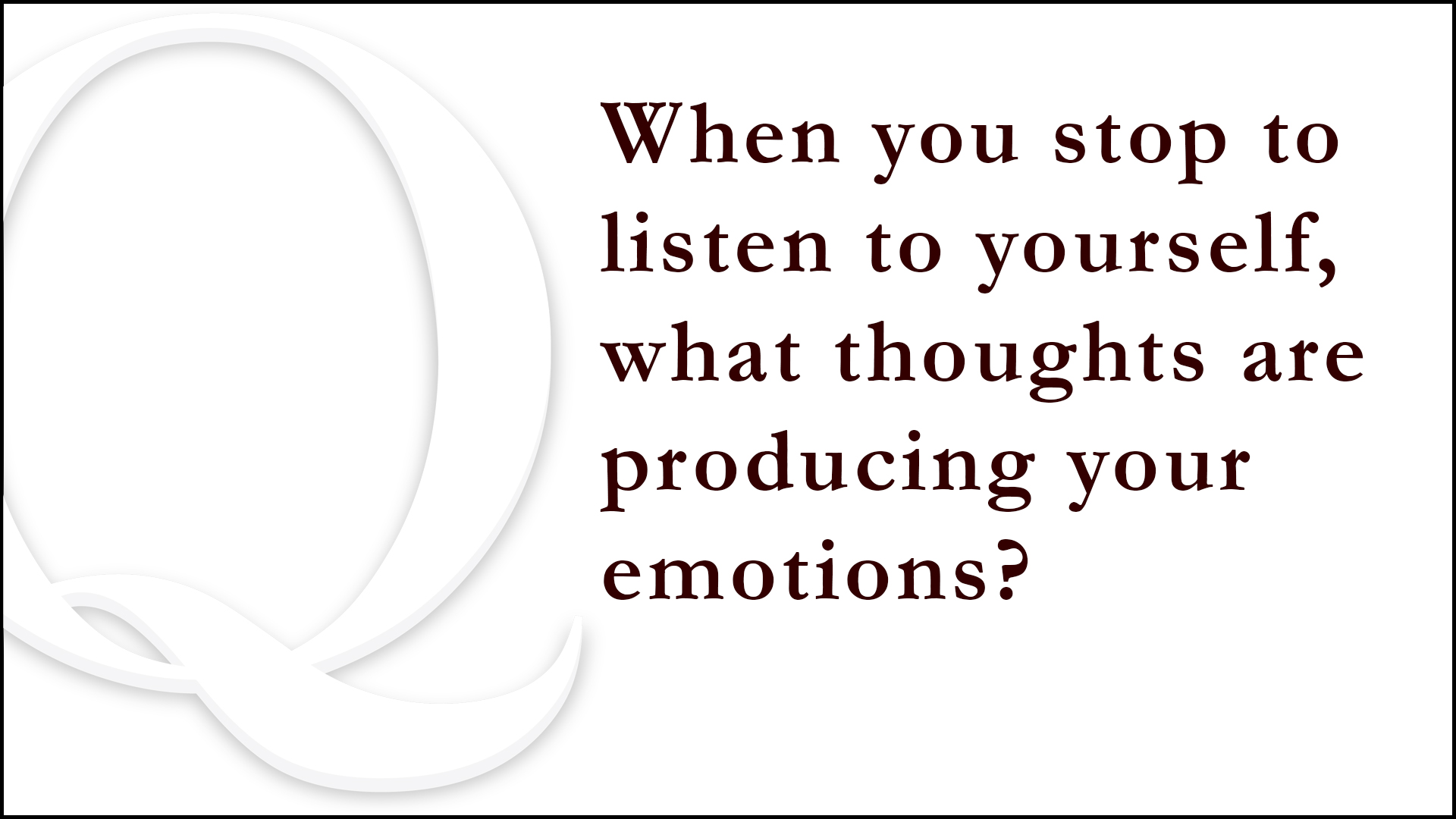Feeling our Thinking
[ theme music & intro ]
So, why is it that we sometimes let our emotions run away with us? When we stop to examine what’s causing much of what we feel, the reason is not that hard to find.
Stay with me this week as we consider exactly that and look at healthy ways of being in elegant control of ourselves and of what we feel.
[ brief pause—theme music fades ]
With the exception of our most primal reactions, most of what we experience, including the things we feel, begin with and are shaped by what we are thinking, either consciously or unconsciously.
To demonstrate my point, here’s a thought experiment you can try right now.
[ brief pause ]
Go to the kitchen in your imagination and get out a lime—a really fresh one. Place it on the countertop and roll it firmly beneath the heel of your hand to loosen it up the juices inside it. How many times have I brought my hand near my nose just to smell the fragrance after doing exactly that? It’s one of my favorite aromas.
photo: Scott Lennox
Place the lime on a cutting board with one end pointing toward you and the other away from you. Then, get out a sharp knife, being careful not to cut yourself as you slice the lime in half from end to end. Notice the sound the blade makes as it moves across the board.
That cut being made, set one of the halves aside and place the other half flat side down on the cutting board and slice it in half from end to end. Once again, be careful not to cut yourself.
Having done that, set one of the quarter lime slices aside and carefully cut the remaining slice from end to end so that you’re left with two slices that are an eighth of a lime each.
Now, put the knife down and pick up one of the remaining slices and put the whole thing in your mouth, skin and all, and slowly chew it up as you taste it and feel it. Take your time. We’re not in a hurry.
[ brief pause ]
What do you notice? Are you salivating? Did the glands suddenly tighten at the corners of your jaw? Did you grimace?
If I asked why, you’d more than likely tell me, “It’s because the lime is so sour.” But, you see, that’s exactly my point. There is no lime. There’s no sharp knife. No cutting board. No pungent aroma. No sour lime juice or bitter rind. There are only your thoughts about those things.
You salivated because your body jumped into action to neutralize an acid that never existed. It didn’t happen because you were
chewing an actual lime, but because of your thoughts about an imaginary one.
Now, admittedly, I made my description of the entire process as vivid as I possibly could. I used carefully chosen language that would engage each of your senses. As I did, and as you listened, your body accepted the experience as though the lime was real. Your nervous system can’t tell the difference between what’s real and what is illusion.
That’s why being conscious of our thinking is so important.
[ brief pause ]
As we engage with the world around us, we create stories about what’s going on and then react to those ideas, often bringing about changes in us that are not in our best interest. For example, if you’re having thoughts that are filled with fear or anger, or thoughts of unfairness or righteous indignation or dread or hopelessness, what feelings or emotions will those thoughts will produce?
You already know the answers.
When we’re not consciously aware of our thoughts, we accept them without examining or challenging them, and we get whatever they produce. On the other hand, when we choose to notice what we’re thinking, we can choose thoughts that free us of negative or self-defeating feelings.
Imagine telling yourself that what you’re experiencing isn’t “fair,” or that things “always go wrong” for you, or that what someone else is doing or telling you is hurting you in some way and you’re powerless to change it. Do your thoughts about it free you to take healthy action, or do they run you in ever-tightening emotional circles?
I can’t estimate how many people in counseling sessions have told me that they feel stuck in the cycles of negative emotions they’ve been having and that their sadness or anger or frustration about it is growing. Yet, after just a bit of focused and honest self-awareness, how many of those same people have made remarkable changes for the better? How many have liberated themselves after years of struggle with the same issues?
Are you ready to do that?
[ brief pause ]
If your answer is “Yes!” this week’s Beautiful Questions might help you create the changes you want as you set yourself free of the cycles you’ve been generating as you’ve been unconsciously “feeling your thinking.”
Question One: What feelings have you been experiencing in the past few weeks are causing you to struggle or feel less than your best self?
Question Two: When you stop to listen to yourself, what thoughts are producing your emotions?
Question Three: What realistic thoughts would help you settle a bit and then take the actions you know to be right for you?
Question Four: What will you do this week to pay closer attention to what you’re thinking and to what your thoughts are producing?
I’d enjoy hearing from you as your answers arise. During this incredible time of change in the world, isn’t it good to know that you can always come back to yourself in strong and healthy ways, controlling the one thing that is yours to control—Yourself.
As I say each week,
My Light with Your Light.
[ theme music swells and fades out ]
[ end ]


